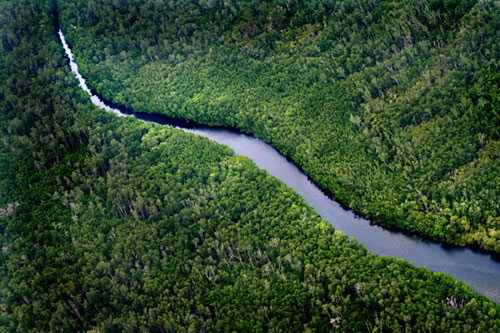Subject: Indonesian President Calls for a Green EconomyDate: June 14, 2012 6:58:52 AM PDTMark Tercek is the president and CEO of The Nature Conservancy.
Yesterday, President Susilo Bambang Yudhoyono made an inspiring speech at the Center for International Forestry Research, calling for a new paradigm in the way that countries and societies approach economic development.
"We need a new way of looking at the world, and a new way of working with the world," he declared. He calls this "sustainable growth with equity," or growth that balances economic, social and environmental aspects.
President Yudhoyono said that Indonesia's economy has changed from one in which forests were sacrificed in return for economic growth, to an environmentally sustainable one where forests are prized for the wide range of ecological services that they provide to society. He declared that by 2025 "no exploitation of resources should exceed its biological regenerative capacity."
It was a bold speech, and an encouraging sign that world leaders increasingly recognize that investing in nature is fundamentally necessary for a healthy, equitable and prosperous world.
Indonesia wasn't always a leader in sustainability. President Yudhoyono admitted that in the 1970s and 80s his country encouraged growth and development without regard to environmental consequences.
"We had lots of forests; we had to reduce poverty; we needed to grow our economy," he said. As a result, logging, mining and the oil palm industry have decimated the country's rich tropical forests. The destruction of those forests produces 80 percent of Indonesia's carbon emissions, placing it among the world's top emitters of greenhouse gasses, behind only the United States and China.
But today, the country is beginning to reverse course. Under President Yudhoyono's leadership, Indonesia has committed to reducing emissions by 26 percent by 2020, and up to 41 percent with international support. The government has also placed a moratorium on new permits to clear primary forests and peat lands throughout the country.
In the past decade, the country's deforestation rate has decreased from 3.5 million hectares per year to less than half a million hectares per year.
What is especially significant is that Indonesia's leadership understands that economic growth can — and must — go hand-in-hand with conserving nature. As population growth, urbanization, and a rising middle class put unprecedented pressures on the natural resources that sustain our lives and livelihoods, nature is an essential tool to make global growth sustainable.
In Indonesia's district of Berau, for example, The Nature Conservancy is working with the government to reduce carbon pollutionby at least 10 million tons over five years — which is like removing roughly 400,000 cars from the road each year — through a number of coordinated strategies: directing agricultural production to already degraded lands, supporting low-impact logging techniques, and assisting the government in measuring and monitoring carbon savings. The target area also includes vital watersheds and critical habitat for orangutans. It's a "triple-win" strategy that is demonstrating how reducing emissions from deforestation and degradation (or REDD+, in the policymakers' community) can simultaneously reduce carbon pollution, protect biodiversity, and promote forest-friendly development.
When President Yudhoyono took office in 2004, his development mantra was, "pro-growth, pro-poor, pro-jobs." Now he's added "pro-environment" as a pillar of his country's development agenda. "Environmental sustainability is at the heart of all [of Indonesia's] long-term development plans," he said.
As our world's leaders prepare to meet at next week's Rio+20 UN Conference on Sustainable Development, I hope we see a lot more of this kind of bold vision. President Yudhoyono's speech this week sends an important message about the importance ofensuring the health of the lands and waters on which natural diversity, human health and prosperity depend. President Yudhoyono will co-host a major event next week in Rio on June 21st convening other world leaders where I anticipate he will make further bold commitments to the wise stewardship of Indonesia's vast marine resources.
[Image: Sungai Wain Forest Reserve in East Kalimantan on the island of Borneo, Indonesia. Image source: Ahmad Fuadi/TNC]
A travel journal for Laurie and Dale
during their first trip to this
faraway land
Thursday, June 14, 2012
Indonesian President Calls for a Green Economy!
This is a very positive and bold statement that I hope can be backed up by action. Inspiring is good but it takes more than speeches and most of the reports that I see these days indicate there is a very long way to go that that a strong program of incentives and enforcement will be necessary to move things along. Let's watch for the comments generated from this by those who are working on these issues in Indonesia now. TNC is certainly one of those groups but those smaller grassroots groups that are closest to the action and issues should count more. Also the Rio +20 conference should be a chance to look back at previous bold speeches and goals to see how they were kept and see what other new ones are made now.
More to come...
Begin forwarded message:
Dale Steele
"Preste la atención a los cielos abiertos usted nunca sabe lo que bajará"
Subscribe to:
Post Comments (Atom)

No comments:
Post a Comment